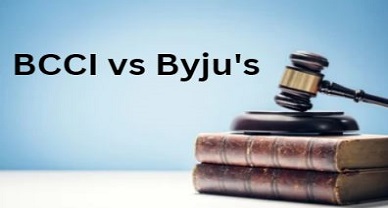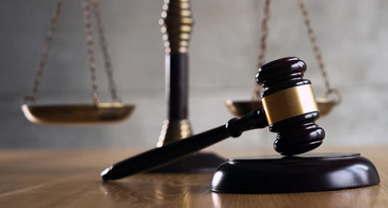BCCI vs Byju’s: Timeline of dispute and Insolvency Proceedings
Introduction
There has been a recent clash between the “Board of Control for Cricket in India (BCCI)” and the Indian Multinational educational giant Byju’s (owned by Think & Learn) over the alleged payment of 158 crores of debt owed by Byju’s. Subsequent to the default in the payment of dues, BCCI had filed an Insolvency case under Insolvency and Bankruptcy regulation (IBC) in National Company Law Tribunal (NCLT), Bengaluru bench back in December 2023 in order to recover the unpaid dues. Byju’s later on filed an application seeking the transfer of dispute to an arbitrator in order to resolve the dispute.
Background:
Business conglomerates have been wanting to take up the sponsorship of Indian cricket team’s jersey owing to the popularity of cricket and fanatics all over the world. Prior to the entry of Byju’s in the whole scenario, oppo had won itself a Five-year deal in order to stamp the Oppo logo on the jersey of Indian cricket team. Oppo had ended up paying a sum of Rs. 1,100 crores to BCCI in the agreement, but soon the Chinese brand realised that it had put itself in the detrimental condition by agreeing to pay a hefty amount. Soon, in the month of September 2019, Byju’s had gained the sponsorship of the Indian cricket team’s jersey which was a tripartite agreement between BCCI, Oppo and Byju’s wherein the transfer of sponsorship had taken place, owing to the fact that Byju’s had been spreading its tentacles in the whole of edtech business. By the virtue of agreement, Byju’s was required to pay Rs. 4.61 crore per bilateral match and also additional Rs. 1.51 crore for the matches taking place under International Cricket Council (ICC).[1]
While in no time after the agreement had taken place, pandemic had hit the world and all of the world started to incline itself to online learning platforms which acted as an impetus for the investors to pour in their money in Byju’s. When in 2022 the contract was coming to an end, Byju’s offered a 10 percent hike for the sponsorship to BCCI and was granted an extension till the November of 2023. Soon, Byju’s filed its accounts for the financial year 2021 in September 2022, and that’s when the reality had kicked in, as the projected revenue was estimated to be Rs. 4,400 crores but it the tangible reality it was only Rs. 2,500 crores, while the losses had surged upto about 20 times higher from financial year 2020.[2]
Over the time, the debts allegedly accumulated amounting to Rs. 158 crores in total from October 2022 till March 2023 for which the BCCI had initiated a suit against Byjus’ parent company Think & Learn under “Section 9 of Insolvency and Bankruptcy Code (IBC) 2016” as an Operational Creditor. It was not until July 2023, that BCCI had found its new sponsor Dream 11 which cracked the deal for a much lower price of Rs 358 Crores for a total of 150 matches to be played with the Dream 11 logo on the jerseys.
- Insolvency proceedings:
The creditors have been classified under two broad categories, i.e.
- Financial Creditors
- Operational Creditors
Under Section 5 (7) of the IBC, financial creditors have been defined:
“(7) “financial creditor” means any person to whom a financial debt is owed and includes a person to whom such debt has been legally assigned or transferred to;”
While under the Section 5 (20) and Section 5 (21) of Insolvency and Bankruptcy Code, operational creditor and operational debts have been defined as follows:
“(20) “operational creditor” means a person to whom an operational debt is owed and includes any person to whom such debt has been legally assigned or transferred;
(21) “operational debt” means a claim in respect of the provision of goods or services including employment or a debt in respect of the 2[payment] of dues arising under any law for the time being in force and payable to the Central Government, any State Government or any local authority;”
The question here remains, that why BCCI took the matter to NCLT, which being a bankruptcy court but Byju’s by the time wasn’t really Bankrupt yet. NCLT had gained it’s life from IBC 2016 and its primary objective is to liquidate companies before the assets of the company looses any more of their value, in order to secure the interest of the creditors.
But why the BCCI took the matter as an operational creditor? The answer to this question lies in the definition of operational creditor under the aforementioned section 5 of the Code.
Financial creditors are those creditors who lend the money directly to business entities for their day-to-day business. The category of Financial Creditors may include the financial institutes such as banks, NBFCs, Bondholders etc.
While on the other hand Operational Creditors are those who lend goods and services to the business entities which could be the supplier of raw materials, supplier of goods, vendors and such other categories of entities or persons who lend goods or services.
How Byju’s is an operational creditor here in this case?
BCCI here in this case had not directly supplied any goods or services to Byju’s but the part where the agreement was to let Byju’s have their logo on the jersey for upcoming cricket matches can be said to fall under the category of services as the BCCI had supplied a part of the cricket team’s jersey for the logo in exchange of consideration which here in this case was money. Thus, BCCI can rightly fall under the category of an operational creditor as it can be said to have supplied Byju’s for services.

NCLT, though had the raison d’etre of liquidation of companies, in the contemporary world it acts as a debt recovery platform for such creditors who are not able to recover their loans[3]. BCCI here had initiated the insolvency proceedings against Byju’s in order to recover the debt, knowing that if insolvency proceedings start against Byju’s an Insolvency Professional would be appointed to take over the control of management of the company and a edtech giant like Byju’s will be compelled to settle up the loan rather than loosing the management of the once most valuable startups worth $22 billion.[4]
Why Byju’s sought arbitration?
“Arbitration is a procedure in which a dispute is submitted, by agreement of the parties, to one or more arbitrators who make a binding decision on the dispute and in choosing arbitration, the parties opt for a private dispute resolution procedure instead of going to court”.[5]
Byju’s might have their own underlying reasons for choosing arbitration over the insolvency proceedings but the primary ones are:[6]
Confidentiality of the proceedings:
This might be one of the biggest reasons for choosing arbitration, as the arbitral proceedings lead to a private resolution process and this process can be kept confidential. This confidentiality is imperative when the dispute involves highly reputed public figures or business giants, as the arguments, statements or evidence provided in the arbitration are completely kept confidential. Thus, if this matter goes for arbitration the reputation of Byju’s will be kept safe, as the functioning of Byju’s depends highly on the reputation of the edtech company.
Option to choose the arbitrator on the option of the parties:
In the arbitral proceedings, the arbitrator is picked by the will and choice of the parties to the dispute. This free will and common consensus between the parties to dispute ensures utmost impartiality in the arbitral proceedings. Therefore, Byju’s and BCCI both will have the option to choose the arbitrator on their own will and meeting of minds which will ensure that there is no biasness.
Time taken for resolution[7]
Usually, the court trials take a lot of time as the courts in the current date are flooded with cases and it becomes hard for the parties to get the dates in near future. At times, it might even take years to resolve a dispute in the courts while on the contrary the arbitration proceedings might be concluded quickly and efficiently as the arbitration dates can be sought and finalised whenever the parties and arbitrator is available.
Legal past of Byju’s
The dispute between BCCI and Byju’s is not the first legal dispute of the edtech company. Since its inception it has been accused of misleading advertisement, delay in the filing of financial reports and also defaulting in the payments of the employees of the company. Thus, if the Insolvency Professional is appointed to take over the management of the company, the company might face some drastic step by NCLT. Thus, referring the dispute to arbitration might be the best alternative which Byju’s might have at the present moment.
Conclusion
While concluding, it becomes an imperative to say that the proceedings initiated against Byju’s have some strong foundation and the primary objective of the initiation of insolvency proceedings is not to declare Byju’s insolvent but rather BCCI has approached NCLT with the objective debt recovery. The following application by Byju’s for arbitration might be beneficial for both the parties, but this has not been accepted by the BCCI as of now as the counsel have sought some time to discuss it with BCCI and it remains a question whether BCCI will accept arbitration as method of dispute resolution in future.
Author:– Maharashtra National Law University, a student at Tamil Nadu National Law University, in case of any queries please contact/write back to us at support@ipandlegalfilings.com or IP & Legal Filing.
[1] NCLT Bangalore: BCCI Files Petition U/S 9 IBC Against Byju’s Over Unpaid Dues, https://www.livelaw.in/ibc-cases/nclt-bangalore-bcci-files-petition-us-9-ibc-against-byjus-over-unpaid-dues-243404 (Visited on February 16th )
[2] Foreign lenders file insolvency proceedings against Byju’s before NCLT Bangalore bench: Report , https://www.businesstoday.in/entrepreneurship/start-up/story/foreign-lenders-file-insolvency-proceedings-against-byjus-before-nclt-bangalore-bench-report-414886-2024-01-25 (Visited on February 16th )
[3]Byju’s owes Indian cricket ₹160 crores, https://finshots.in/archive/byjus-owes-indian-cricket-160-crores/ (Visited on February 16th )
[4] Byju’s plans to end sponsorship of Indian cricket team jersey, as it puts profitability on cards for 2024, https://www.cnbc.com/2023/01/20/byjus-plans-to-end-sponsorship-of-indian-cricket-team-jersey-as-it-puts-profitability-on-cards-for-2024.html#:~:text=Davos%20WEF-,Byju’s%20plans%20to%20end%20sponsorship%20of%20Indian%20cricket%20team%20jersey,profitability%20on%20cards%20for%202024&text=Indian%20education%20technology%20start%2Dup,founder%20Divya%20Gokulnath%2C%20told%20CNBC. (visited on February 16th )
[5] What is Arbitration?, WIPO, https://www.wipo.int/amc/en/arbitration/what-is-arb.html#:~:text=Arbitration%20is%20a%20procedure%20in,instead%20of%20going%20to%20court. (Visited on February 16th )
[6] Explained: Why Byju’s is seeking arbitration in dispute with BCCI over cricket sponsorship, https://timesofindia.indiatimes.com/gadgets-news/byjus-arbitration-dispute-with-bcci-explained/articleshow/106988785.cms (Visited on February 16th )
[7] The Advantages and Disadvantages of Arbitration, https://www.sacattorneys.com/the-advantages-and-disadvantages-of-arbitration.html ( Visited on February 16th )


